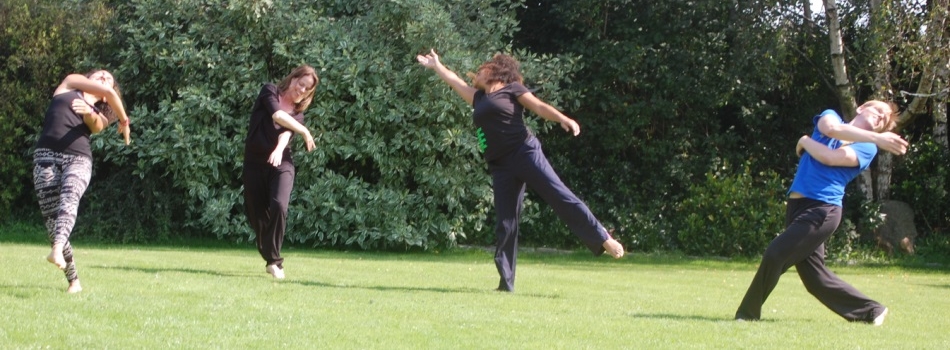
Laban Movement Studies – History, Applications and Frontiers (Season 1)
Recorded Webinars
Karen K. Bradley, Karen Studd, Hilary Bryan, Barbara Nordstrom-Loeb
About the Webinar Series
This acclaimed Laban webinar series, presented by Inspirees Institute, was one of the first series of this kind in the world, since it was launched in 2018. In 2024, we present a newly edited version with improved video and materials on Udemy to enhance the learning experience of the students. The experts from different fields have shared with the audience the fascinating stories and development of the history, applications and frontiers in the Laban field.
This webinar series is primarily intended for researchers, educators and practitioners who have interest in Laban movement studies and would like to broaden their knowledge in Laban field. It is also a platform for exchanges among professionals, and a strong supporting module for the Certified Movement Analyst studies. However, it is not the replacement for systematic training for Laban theory. The participants should have some basic knowledge about Laban theory in order to follow the seminars. Otherwise, we recommend you to follow some basic course of LMA/BF and study the materials below.
Some references
- Body Movement: coping with the environment. Irmgard Bartenieff, Publisher: Routledge ISBN 0677055005
- A primer for movement description. Cecily Dell, Publisher Princeton Book Co Pub ISBN 0932582036
- Space Harmony. Cecily Dell, Aileen Crow. Publisher Princeton Book Co Pub ISBN 0932582125
- Rudolf Laban. Karen Bradley. Publisher Routledge ISBN 0415375258
- Everybody is a body. Karen Studd & Laura Cox. Publisher Dog Ear Publishing ISBN 1457518503
- Be Fluent in Your Other Native Language. Karen Bradley, Tony Zhou. Creative Arts Education and Therapy, 2015, 1(1): 53-62. http://caet.quotus.org/article/CAET/2015/1/7
Our webinar series will be released in three seasons, with the first season available now and the subsequent two seasons to follow. Join us on this enlightening journey through the rich tapestry of Laban Movement Studies.


Content for Season 1
Seminar 1 Laban History: A Legend Karen K. Bradley (US)
Rudolf Laban is a well-known and controversial figure in the world of dance. But who was he really? Join Karen Bradley on a voyage through his contradictions, complexities, and choreographies. Learn about the theories and ideas about human movement that inspire us still today.
Seminar 2 Laban and Somatics: Global Perspectives Karen Studd (US)
This webinar broadly addresses the topic and field of Somatic Practice. It includes a brief overview of this subject, its historical roots development and characteristics. It also discusses the link to the Laban/Bartenieff Movement System (LBMS) and its relationship to the field of Somatics.
seminar 3 Laban and Embodied Leadership\Coaching Karen K. Bradley (US)
Good leadership is dynamic, expressive, and adaptive. Utilizing observation skills, analysis of personal style, interactions, group behavior and cultural pattern, all of it based in Laban Movement Analysis, the webinar unpacks some of the approaches to coaching political and business leaders. How can Laban’s work help performance in the workplace for those at the forefront of winning? You will find the answers.
Seminar 4 Laban and ergonomics\Physiotherapy Hilary Bryan (US)
CMA Hilary Bryan presents her application of Laban Movement Analysis (LMA) to workplace ergonomics. Since 1999 Bryan has been coaching office workers in injury prevention using LMA and Bartenieff Fundamentals to provide body-based approach to computer injury. Based in San Francisco and New York, her consulting business, The Body at Work Ergonomics, offers individual coaching and corporate seminars designed to prevent repetitive strain injuries. Instead of recommending expensive equipment, The Body at Work focuses on the movement causes behind computer injuries and gives computer users body-based tools to navigate their equipment safely. Learn how LMA and BF provide concrete experiences that help people learn to work free from pain. Give yourself an experience of movement efficiency and ease that your body will understand immediately. Feel for yourself how LMA can create lasting change and have practical impact in your life.
Seminar 5 Laban and Neuroscience Karen K. Bradley (US)
Neuroscientists have discovered that the body and mind are not engaged in separate processes, nor does the mind control the body. Laban Movement Analysts have understood the ways on which function and expression are intertwined and serve each other. Recent experiments using Laban Movement Analysis to correlate with brain-based patterns is discussed, and a case made for further such experiments.
Seminar 6 Laban and Dance Therapy, Family Therapy Barbara Nordstrom-Loeb (US)
We all have bodies and we are always moving. Our movements express and communicate all of our experiences and life stories, whether we know it or not. Addressing the deeper meanings of these movement patterns, Laban Movement Analysis (LMA) is an essential tool for understanding and working with human behaviors. Dance/movement therapy, in particular, uses LMA to help clients engage more authentically in their lives, families and community. The poet Rumi talks about the paradox of our body which both “hides and reveals what is hidden”. Learn how LMA helps therapists unravel these paradoxes using non-verbal expressions to uncover answers to the issues clients bring to therapy and to guide what happens during the therapy session.
Speakers:
Karen K. Bradley, CMA

Karen K. Bradley is the former head of dance and director of graduate studies at the University of Maryland, near Washington, DC. She is the President of the Laban/Bartenieff Institute of Movement Studies and the author of Rudolf Laban, a volume in the Routledge series on 20th Century performance practitioners, and a teacher of the Laban and Bartenieff material around the world.
Karen Studd, CMA

Karen has a Master’s degree from University of Oregon and certification in movement analysis from the Laban/Bartenieff Institute of Movement Studies. Studd is also a Registered Somatic Movement Therapist and Educator through ISMETA (International Somatic Movement Education and Therapy Association). Studd is a LIMS Program Coordinator and has taught in movement analysis training programs in the US, Canada, Europe, Mexico, Israel and in China. Karen has taught for the Dance Departments of the University of Oregon, the University of Wisconsin, George Washington University and George Mason, where she was a tenured faculty. As a teacher of Movement Analysis, she is focused on personal and professional development through awareness of movement. Her interest is in the understanding of the importance of human movement across all disciplines. Studd is a co-author of EveryBody is a Body, a text on the phenomenon of human movement.
Hilary Bryan, CMA

Hilary Bryan, CMA, MFA, performer, choreographer, movement analyst and scholar, has taught modern dance, contact improvisation and Laban Movement Studies at universities and dance festivals internationally. She has taught on the faculties of the Moscow Institute of Therapeutic Arts, the Russian Association of Dance Movement Therapy, and the Integrated Movement Studies LMA certification programs. Bryan founded the ergonomics consulting firm The Body at Work in 1999 basing its curriculum on her thesis work on ergonomics at the Laban/Bartenieff Institute of Movement Studies. Her choreographic work has been presented internationally and she adjudicated the International Competition of Contemporary Choreographers (Kiev, 2007). She is currently a doctoral candidate at the University of California Davis in Practice as Research.
Barbara Nordstrom-Loeb BC-DMT, LMFT, CMA

Barbara Nordstrom-Loeb is a dance/movement therapist (DMT), licensed Marriage and Family Therapist (LMFT), Somatic Experiencing Practitioner (SEP). She teaches DMT and LMA courses at universities and colleges in the US as well as internationally, including teaching in Estonia on a Fulbright Scholars Grant. She is the out-going chair of the American Dance/ Movement Therapy Association Alternate Route Educators’ Subcommittee. Her publications include writings on the use of trauma and DMT-based approaches with people diagnosed with Eating Disorders, the development of DMT programming in long term care facilities, and the historic development of DMT in Estonia.
Register for the webinar series (season 1)
- Format: video recordings, full lifetime access
- Fee: standard price: 59.99 USD;
- Discount price: 49.99 USD (with coupon: D3390B220E0F3C7FD5A3, from 2024.3.21 – 4.21)
- Click here to register
- Send email to education@inspirees.com for any question.






